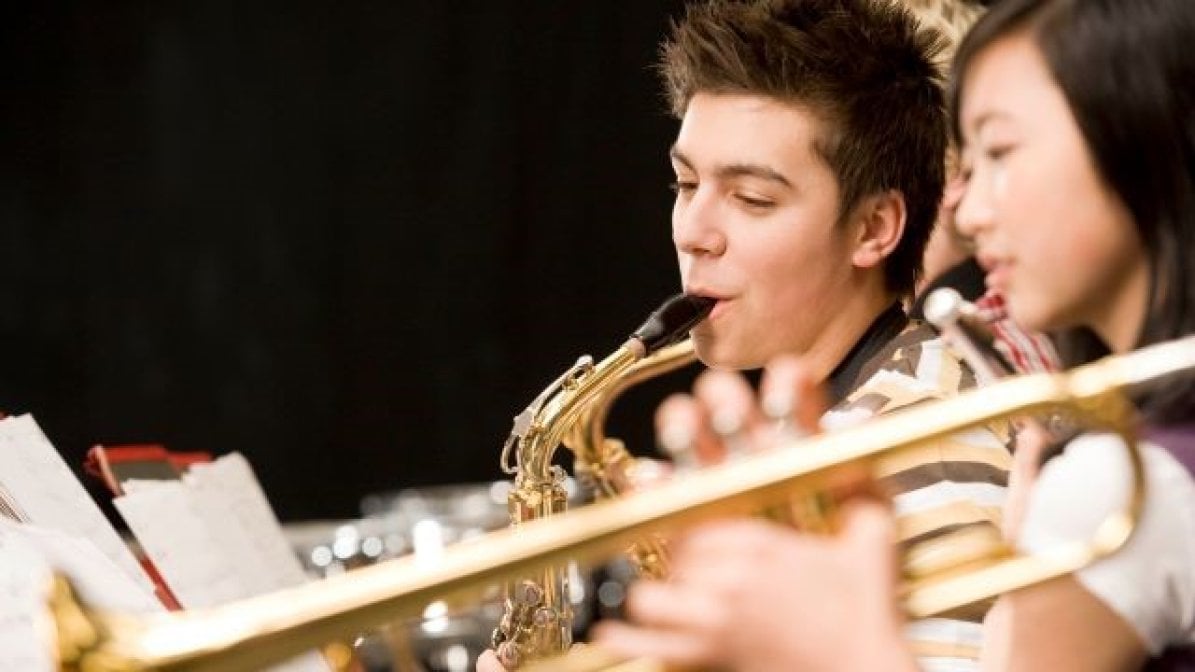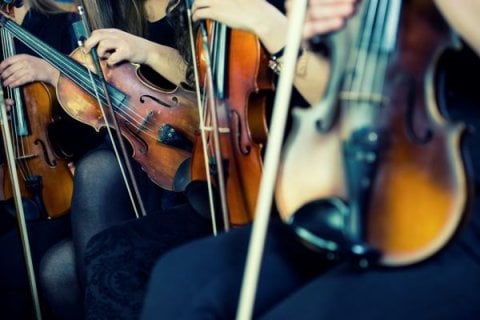
Music 2026 personal statement guide
Whether your musical interests lie in performance or music history, think engaging, detailed and relevant to strike the right note with music admissions tutors.
Admissions tutors are keen to know about you, your musical interests, abilities and aspirations. Whether you want to be the next Sabrina Carpenter, Jack Antonoff, or Tiffany Poon, make sure you tailor your application to the course you’re applying for and show off your relevant musical passions.
What do admissions staff at universities, colleges, and conservatoires want to see?
Working out what to include in your personal statement can feel daunting, but we’ve got some tips to help get you started.-
1
Think about why you want to study the subject
- Have you been inspired by someone, a news story, a documentary, or a podcast?
- Do you have career aspirations in this area of study?
- What interests you about the subject – be specific; rather than saying you enjoy it or are good at it, try to explain the ‘why’ behind your reasoning.
- What do you already know about the subject and what are you looking forward to learning more about?
-
2
What makes you suitable to study the subject?
- Have you done projects or essays in this subject at school or college?
- Think about who you are as a person; your personality, your strengths, your experiences in life – how do these make you suited to study the subject?
- How have you shown an interest in the subject outside of school or college – have you done extra reading, online courses, been part of clubs or competitions?
- Your current subjects and grades will be included elsewhere in your application, so try to think about specific things you’ve learned during your studies that relate to the subject, rather than listing your grades and subjects.
-
3
Look at the bigger picture
- Have you done any work experience, an internship or had a part-time job in this subject area or related? Most job or work experience will give you transferable skills, even if it’s in a different industry.
- Do you have any hobbies you can mention that might relate to your chosen subject? Many hobbies show that you can be motivated outside of school to achieve and succeed in something you’re interested in.
- Think about how your life and personal experiences have helped make you the person you are today, and how these challenges and experiences can support your application by evidencing essential qualities for certain subjects.
- If you’ve got ambitions and goals for your life and career, can you express how this subject will help you reach these goals?
Guidance and examples you can use
Question 1: Why do you want to study this course or subject?
This is your opportunity to showcase your passion and knowledge of your chosen subject area and to demonstrate to universities, colleges, and conservatoires why it’s a good fit for you and your future ambitions.
Examples:
- Professor Kirsten Gibson, Music Admissions Tutor and Programme Leader at Newcastle University, is looking for detailed, engaging examples of your musical experiences, interests, and your academic and musical aspirations. These could lie in performance, composition, music history, analysis, ethnomusicology, or elsewhere.
- Show an awareness of what different music courses cover; practical or academic, your statement should engage directly with the actual courses you’re applying for. If you're applying to a conservatoire, do refer to the relevant advice on our website.
- For academic courses, in particular, mention additional reading you've done around the subject – whether that’s something like The Creation of Beethoven’s Nine Symphonies or Rick Rubin’s The Creative Act: A Way of Being – and include what you've learned from it. You should also be prepared to expand on this during an interview.
Question 2: How have your qualifications and studies helped you to prepare for this course or subject?
This is your chance to shout about the relevant or transferable skills you’ve gained from your formal education and highlight your understanding of how they will help you succeed in this subject area.
Examples:
- What skills have you learned from different aspects of music you’ve studied so far? Maybe you’ve learned about preparation and practice for performance, creativity for composition or attention to detail for theory.
- Think about how revising has helped with your procedural memory (useful when learning an instrument), or how maths or science has developed your analytical skills and why they’ll be useful on your chosen course.
- If you’re interested in music production or technology, are there any projects you can reference from information technology (IT) or other studies? Or maybe you’ve already been editing music on software at home.
- Have you done any online courses to boost your knowledge in the subject? For example, why not try Subject Spotlights or Virtual Work Experiences from Springpod to grow your skills and interest?
Question 3: What else have you done to prepare outside of education, and why are these experiences useful?
This is your chance to talk about any other activities you have undertaken outside of your formal education, or personal experiences which further demonstrate your suitability for the course. This section is likely to be highly personal to you and anything you do include should reflect on why you’re including it.
Examples:
- Rather than reeling off a list of what you've done, try and write reflectively about the insights, skills, and knowledge you've gained from a select few experiences. For example, is there a type of musical theatre you’re passionate about and shows or composers you can critique?
- Write about any clubs you’re involved in, whether it’s a drama or theatre group, enterprise club or a film club, and how they relate to your chosen course. For example, maybe your film club has led you to want to be the next generation’s Hans Zimmer.
- The University of Bristol is also keen to see examples inside or outside of your studies where you've demonstrated your abilities to work well as part of a team. This could be through a sports team, Duke of Edinburgh award or part-time jobs working in a bar or restaurant, for example.
Dos
- Do relate any examples back to the subject you’re applying to – make it relevant
- Do make it personal – admissions staff want to get to know who you are
- Do use a spell-checker and grammar-checker to ensure there are no errors
- Do ask people for feedback, whether that’s family members or teachers
- Do your research to find out what universities are looking for, and make sure you include evidence to show how you are suitable for the course
Don'ts
- Don’t just list out examples, subjects you study, or experiences you’ve had without any evidence
- Don’t copy something you’ve seen online or use AI to write something for you
- Don’t make things up just because you think they’ll make you look good on paper
- Don’t leave it until the last minute – you need time for several drafts
- Don’t worry about making each section the same length; as long as you hit the minimum character count, you can use the 4,000 characters across each answer in the way that suits you best
How to set yourself apart
The key to setting yourself apart in your application is to remember how important the ‘personal’ bit is to your personal statement. What makes you, you?
What styles of music do you enjoy that relate to your course, whether it’s opera, jazz, grime or pop music? If you can, critique their style and what inspires you, whether it’s Stormzy or Jonas Kaufmann.

If you’ve faced challenges in your personal life, what qualities has that brought out in you, such as resilience, empathy or determination, and how will this help you on your course?
Reference other cultural interests or activities that give a fuller picture of you as a person. If you’re interested in current affairs, can you reference a news story that relates to music, whether it’s funding for the arts, an award a musician has won, or a campaign to keep a grassroots music venue open. Or if you enjoy reading historical fiction, reflect on what that has taught you about musical tastes and instruments from different periods of history – but only if it’s relevant to a module you’re hoping to study during your degree, such as music history.
Some more tips to consider
- Avoid clichés: Avoid the likes of ‘music is my life' or ‘music is a universal language’ and instead make it personal to you and your cultural experiences.
- Research the course: Make sure your statement shows you've researched your courses carefully, to ensure they suit your musical and professional aspirations. If it's a course that focuses on music production or technology, for instance, then your statement needs to talk about your practical and academic interests in these areas.
- Don’t replicate: Including information on additional music qualifications and grades you have is important, but put these in the qualifications section of your application so you don’t have to waste valuable space in your statement.
- Making your work experience count: If you work-shadowed a conductor, a music producer, a music teacher or a record company, that’s great, but make sure you spell out what you personally gained from it.
- Transferable skills: Whether through extracurricular or supercurricular activities, work experience or a part-time job, you’ll have lots of skills that will be relevant to your course. Try to think outside the box – ok, so you play on a netball team; can you explain how that has given you teamworking and communication skills, and helped with your self-motivation and time management?

Interested in studying at a conservatoire?
What are conservatoires like? How do conservatoires differ from a university or college? Find out here.Find out more about music
